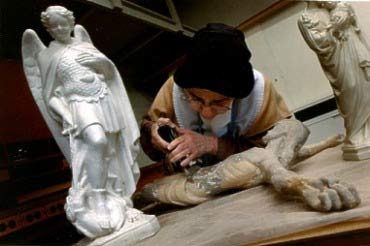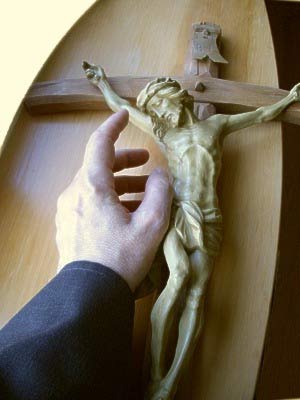|
|
| Conversion is a turning towards Christ, and a returning through Christ to the Father. Conversion is a turning of our eyes to the radiant Beauty each of us was created to contemplate; it is a turning of the ear to the Voice that calls each of us by name. Conversion is a turning of the mind to the Truth which dispels all our inner darkness, and a turning of the heart to the Love which alone can satisfy our deepest longings and heal our wounds. At the deepest level, conversion is a turning towards the Son in response to the Word of God, so as to return through the Son, and with the Son, to the Father in the Holy Spirit. |  |
|
 |
Conversion is also a grace of ascension: 'I am leaving the world and
going to the Father' (Jn 16:28). The Church, clothed in the vesture of penitence, replies, 'Draw me after you, let us make haste and run (Cant 1:4). It is impossible to turn towards Christ, impossible to breathe in the fragrance of the knowledge of Christ without being caught up in his ascension to the Father. Conversion to Christ and ascension to the Father are two moments of a single movement in the breath of the Holy Spirit. Conversion without ascension is incomplete. It is not enough for God that we should turn towards him, not enough that we should open our ears to his voice. The passion of God is that we should be with him even as the Son is with him (cf. Jn 17:24), that we should ascend even into the secret of his own life, so as to experience his love from within the circle of his own Trinitarian life. |
|
| The
transfiguring prayer of Jesus to the Father is the expression in space
and in time of their eternal exchange of love in the Holy Spirit. Our
gaze should be riveted on the face of the praying Jesus. Contemplating
the face of Jesus, we are drawn after him in his ascent to the Father,
and like Peter, James and John on the Mount of the Transfiguration,
become a part of that prayer. They are overshadowed by a bright cloud
manifesting the presence of the Spirit of glory. They hear the voice
of the Father commanding them to listen to the Son, the Beloved given
to Israel as Bridegroom and as Christ. Here we learn that all prayer
is to be lost in the prayer of Christ; it is to hear the voice of the
Father and to be enveloped in the bright cloud of the Holy Spirit.
Christ is given by the Father bring us be 'where he is' (Jn. 17:24),
there to behold his glory. This is the radiant goal of our conversion.
This is the end of conversion, that we should become a transfigured,
crucified, risen and ascended Body, a Body filled with joy at the sight of the Father's glory. |
 |
|
| St. Francis' first followers were called "the joyful penitents of Assisi", for they knew the freedom which comes from admitting one's sinfulness before a loving and merciful Father. St. Clare too, was "always joyful in the Lord". On her deathbed, responding to one who was comforting her in her suffering, she said, "Since I experienced the grace of our Lord Jesus Christ through the merits and teaching of our Father Francis no suffering has been hard for me, no exertion or penance or illness painful." | ||
| Both Francis and Clare who were children of their time, performed extraordinary penances according to the medieval understanding of sanctity. Our penance in the 21st century is to live a frugal lifestyle, to eat simple meals, work hard at manual labor, endure cheerfully less than ideal indoor and outdoor temperatures, submit to a daily schedule, to lovingly bear one another's burdens of physical weakness and spiritual poverty, and to deny the free exercise of our wills in obeying the command of our superiors. In short, we follow our Lord's exhortation, "Take up your cross daily and follow Me". Thus we live no longer for ourselves, turned in upon ourselves, but for Him who has loved us. | ||
